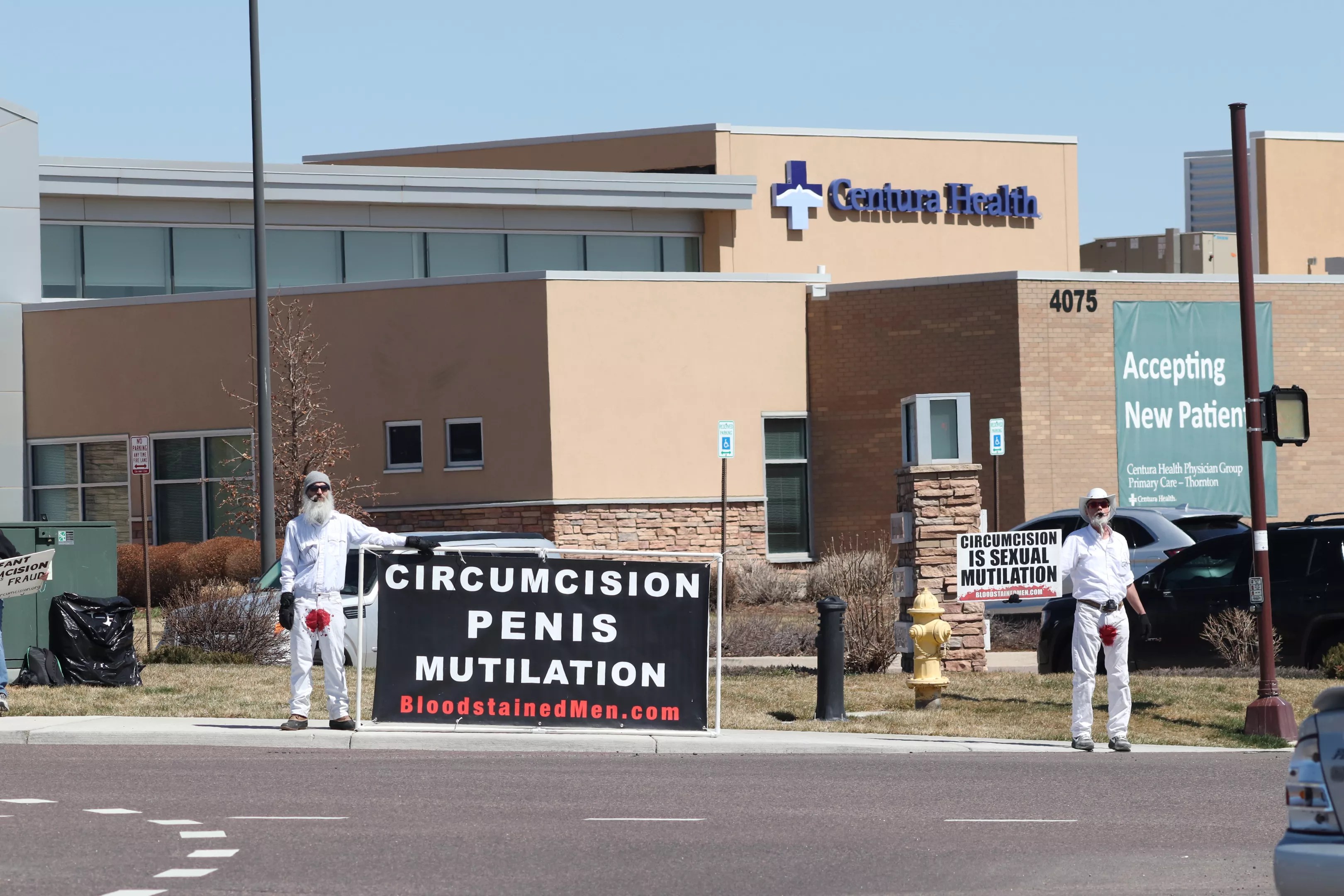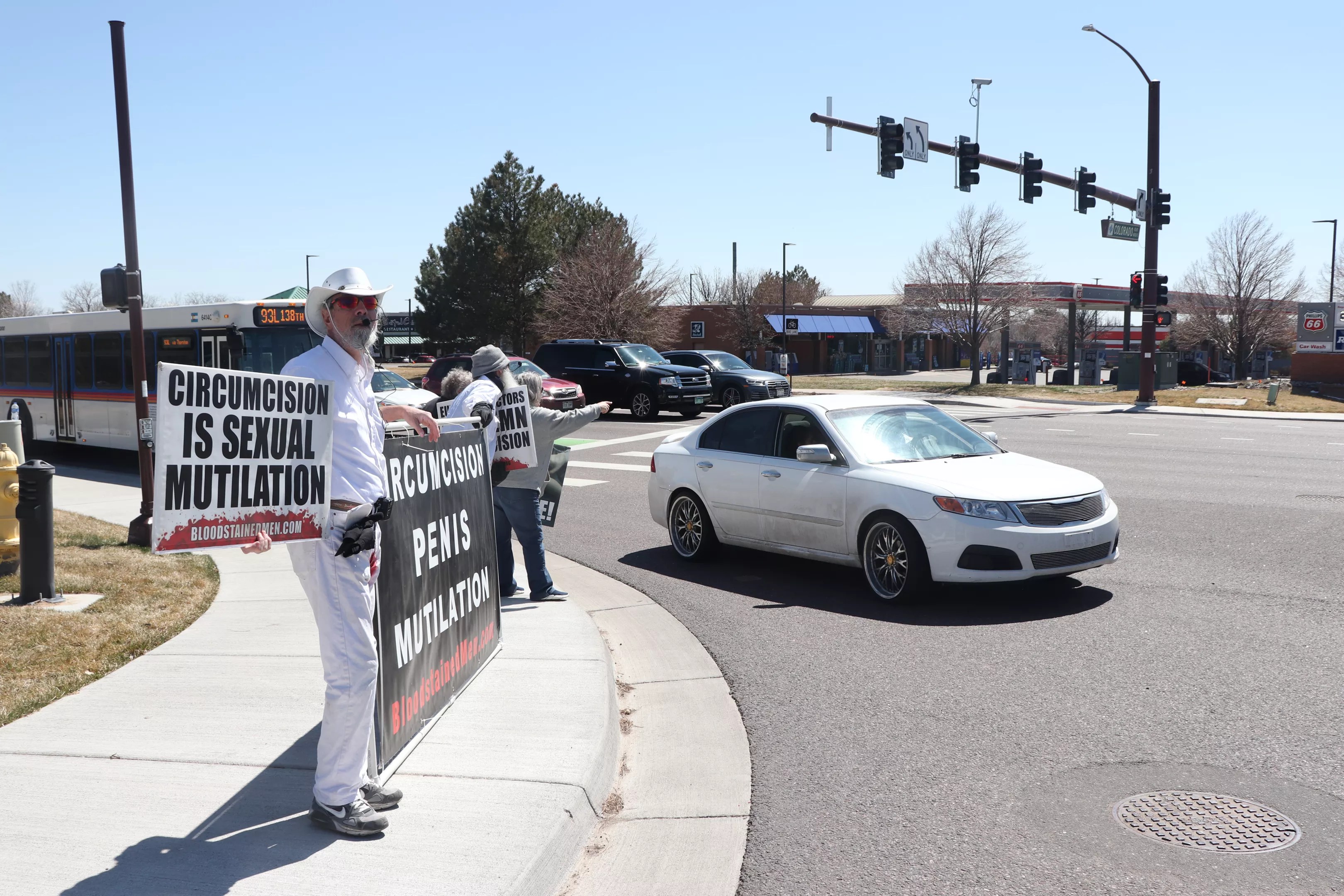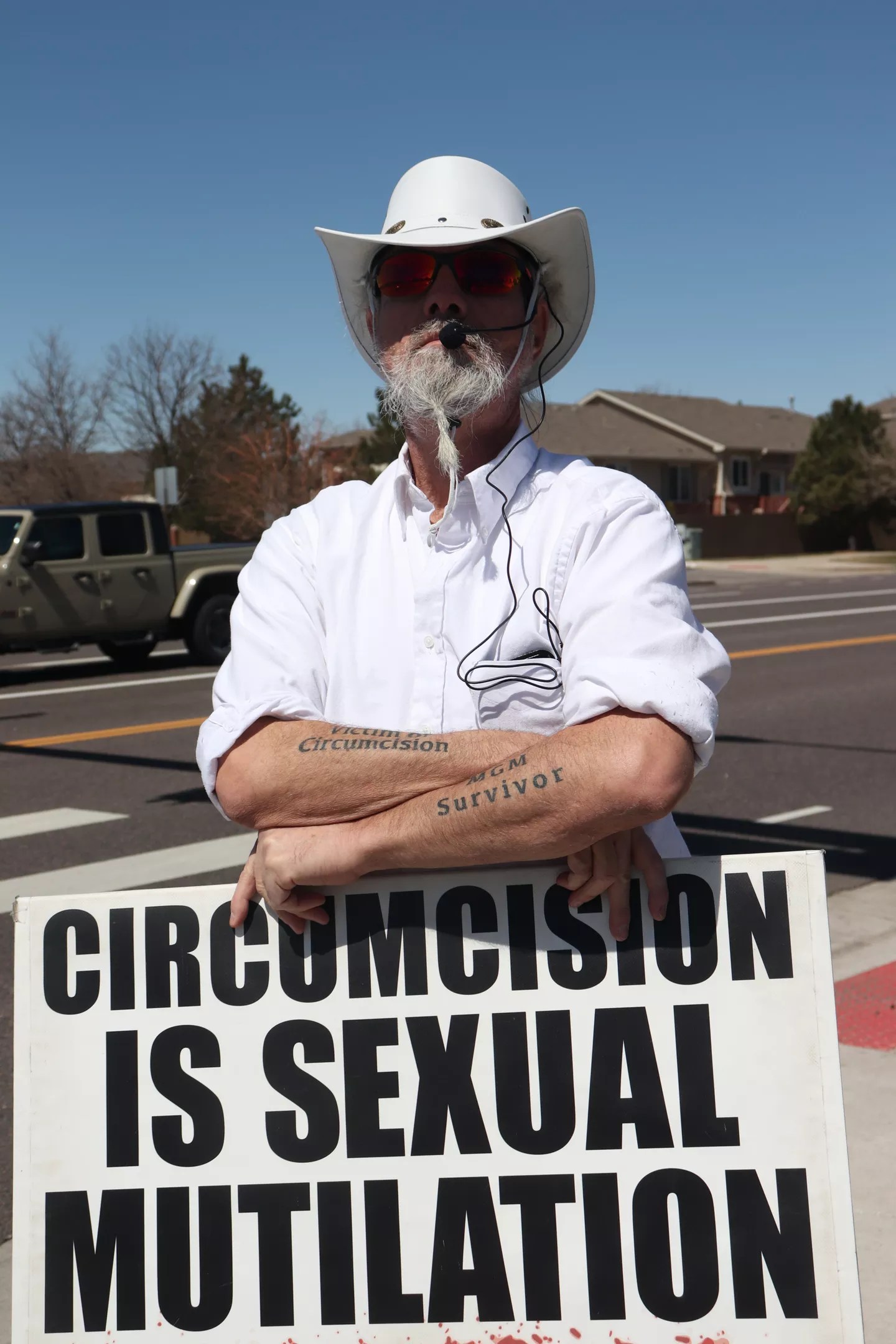
Benjamin Neufeld

Audio By Carbonatix
Standing outside of Centura Health Primary Care in Thornton on April 6, two men dressed in all-white garb – except for a large, blood-red mark on the crotch of their pants – faced traffic and held a large sign saying, “CIRCUMCISION PENIS MUTILATION.”
The protesters, part of a group called the Bloodstained Men, were out in force demonstrating against a video that Dr. Corinn Gayer, a primary-care physician at the Thornton clinic, had posted online, in which she discusses circumcision and her preferred method for performing the procedure.
The “intactivists,” as they call themselves, not only called for the end of circumcisions, both globally and at this particular clinic, but they also sought to raise awareness about what they believe is the procedure’s cruelty.
It’s a cry that the Bloodstained Men have long issued across the country, repeatedly visiting Denver and other cities to hold protests and “educate” the public about “the rights of all children to keep all parts of their genitals,” according to the group’s website.
Joining the bloodstained pair were other supporters, holding signs of their own with messages such as “END MALE GENITAL MUTILATION” and linked to websites like “yourwholebaby.org.”
Around noon, a motorist pulled up to make a right on Colorado Boulevard and yelled, “There’s nothing wrong with my penis. It’s beautiful! And my wife is pregnant with my son, and he’s going to get clipped!”
The protesters shouted at the man, whose wife sat next to him in the passenger seat. “No, no, no! Never pull the foreskin back,” said one Bloodstained man, referring to the fact that without circumcision, the foreskin generally does not separate from a male’s private parts until at least age five.

A heated exchange during the Thursday demonstration
Benjamin Neufeld
Fired up by the interaction, protester Daniel Bryce decided to try to talk to the people inside the Centura location.
In Gayer’s video, the Thornton physician slices away at the technicalities of circumcision, peeling each step back and revealing what actually goes into it. “Typically, there’s three common ways to perform this procedure,” she tells viewers, noting that she prefers the “Gomco procedure,” which involves the use of a controversial tool called the Gomco clamp.
Bryce calls the Gomco clamp “a horrible torture instrument.”
According to Bryce, Gayer had originally posted the video on Facebook, but after a debate in the comments section, she deleted it from her account.
Lindsey Radford, a spokesperson for Centura Health, confirms that Gayer is currently employed by Centura, and quickly responds to the group’s claims about the clinic’s medical practices.
“At Centura Health, we are committed to providing compassionate, whole-person care to our patients,” Radford says. “We believe each family has the right to decide what is appropriate for their child, and we encourage parents to weigh medical information in the context of their own religious, ethical and cultural beliefs and practices. We respect and honor the decisions made by the caregiver(s) and are committed to supporting them as they welcome their child into their lives.”
Dolores Sangiuliano, a nurse and longtime anti-circumcision activist who attended the protest, says Gayer “fails to mention in her video the risks of complication of circumcision” and “death as a complication and risk,” claiming that Gayer spoke about the Gomco procedure in a “positive and loving way, with zero regard for the victims.”
Sangiuliano has been involved with the anti-circumcision movement for 41 years, ever since reading Immaculate Deception, by Suzanne Arms, where she first learned about circumcision.
“I couldn’t believe it,” she says. “It was beyond my ability to comprehend that somebody would just take a baby and cut his penis apart.”
While it’s typical for the Bloodstained Men, this particular kind of public protest is not something Sangiuliano participates in often. “I don’t usually like these kinds of street-corner demonstrations,” she says.

Daniel Bryce showing off his tattoos
Benjamin Neufeld
Prior to the COVID-19 pandemic, Sangiuliano attended protests in Washington, D.C., organized by groups like the National Organization of Circumcision Informational Resource Centers (NOCIRC), which was later absorbed by the larger organization Intact America, as well as Doctors Opposing Circumcision, the Catholic group Little Images and the Jewish organization Beyond the Bris.
According to the Bloodstained Men, their theatrics are part of an intentional strategy to draw people’s attention and generate conversation. Bryce says that onlookers take pictures and post them on social media, which gets people talking. This then “causes all kinds of interactions; their family, their friends, find those posts,” he adds.
Luke Artanis, who wore a Bloodstained suit at the April 6 demonstration, says humor has been an effective advocacy strategy for the group. Artanis also co-founded the organization Cockfight, which engages young people on campuses or at other casual settings like football games. “We introduce the message in a creative way that’s not so emotionally intense, so people can kind of laugh about it and say, ‘Yeah, I don’t agree with circumcision, either,'” notes.
Artanis says he wants to be “humorous and inviting so that people approach us and have conversations” about circumcision instead of being repulsed by the subject. “I’ve gone in the Bloodstained costume to universities, and the kids kind of feel off-put by it and afraid to talk and ask questions,” he observes.
According to Bryce, the red stain on the outfit ultimately signifies “mutilation at birth.” He’s so passionate about fighting foreskin futility that he’s tattooed the phrases “Victim of Circumcision” and “MGM (Male Genital Mutilation) Survivor” on his forearms. Though he and the other members of Bloodstained Men may look crazy, their strategy seems to be having an effect.
Over her forty years of advocacy, Sangiuliano says the reception to their message has grown much more positive. “Thirty years ago, I was invited to speak at a college, and I spoke to a bunch of men, and all but two of them walked out before I was even done,” she says. “About twelve years after that, I spoke to another college group, and they couldn’t get enough. They clapped and took all of my information.”
According to the Centers for Disease Control, newborn circumcision rates have fallen from 64.5 percent in 1979 to 58.3 percent in 2010.
Intactivists ultimately believe it’s wrong to mutilate any part of a child’s body without their consent, and they cite numerous medical organizations, including the American Academy of Pediatrics, which says that the medical benefits of circumcision are not sufficient to recommend routine circumcision for all newborns. Other groups, like Stanford Medicine Children’s Health, suggest that circumcision makes no difference for health and hygiene as long as a boy can handle cleaning and caring for himself.
In addition, the group claims that foreskin removal decreases sexual pleasure, adding that a large reason for the procedure’s popularization was to prevent masturbation. Scientific papers have suggested that circumcision can decrease penile sensitivity and masturbatory and sexual pleasure.
As he attempted to enter the Thornton Centura clinic to present these arguments and others, Bryce was swiftly turned away by a security guard. He was not deterred, however.
“I have to deal with this every damn day,” he said. “I have a right to be angry. I’ll be doing this until the day I die.”